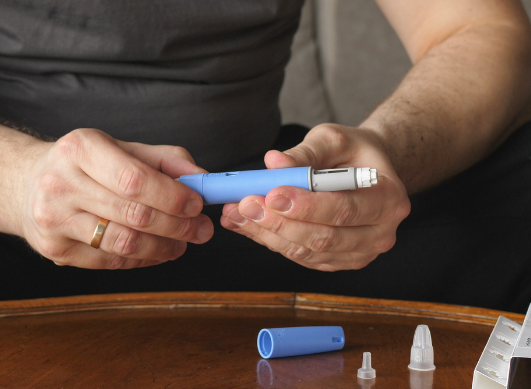Obesity: What surgical treatments are available?
Published Mar 4, 2021 • By Clémence Arnaud
Obesity has been on the rise for a number of years in the US. This weight disorder can significantly increase the risk for or lead to many other health problems. Bariatric surgery is a treatment option that can help patients overcome obesity.
What are the different types of bariatric surgery? Who is eligible for this type of surgery? Is there specific care for these patients?
We tell you everything in our article!
This article was written in partnership with the patient association Vivre autrement ses formes (VASF) (Living your curves differently). We thank them for their help.

Surgical solutions in the care for obesity
Different surgical procedures are possible and each are considered according to the individual.
- Sleeve gastrectomy: Also called vertical sleeve gastrectomy, this is a permanent procedure in which the stomach is approximately 80% of the stomach is removed, reducing the stomach to about 15% of its original size. Ghrelin, the "hunger hormone" responsible for appetite and the feeling of hunger, is produced by cells the upper area of the stomach (the gastric fundus), so this portion of the stomach is often removed, helping to contribute to weight loss. This procedure cannot be undone.
- Gastric bypass: This technique, often considered the "gold standard" of weight loss surgery, similar to other bariatric procedures, aims to reduce stomach size, which helps to reduce food and therefore calorie intake. It involves creating a small stomach pouch (about the size of an egg) by dividing the upper stomach from the rest of the stomach, and then connecting a Y-shaped section of the small intestine to the pouch, creating a bypass for food. Because this technique shortens the digestive tract, the patient absorbs fewer nutrients, so daily vitamin and mineral supplements must be taken for life. Depending on the particular technique of gastric bypass used, the procedure may or may not be reversible.
- Adjustable gastric band: Commonly called lap-band or LAGB, this technique involves an inflatable band that is placed around the upper part of the stomach, which creates a small stomach pouch and therefore reduces the volume of the stomach. This helps to limit appetite and the amount of food that can be consumed. Medical follow-up is more extensive with this procedure in order to avoid infection, displacement or rupture of the band, which can be painful. This method is both reversible and adjustable.
Strict criteria to be eligible for bariatric surgery
Surgery is not a first line decision for people living with obesity. Bariatric procedures come into the picture only after other nutritional, medical or psychotherapeutic techniques have failed. People who can benefit from bariatric surgery are those who are obese (BMI ≧ 40kg/m²) or people with a BMI ≧ 35 KG/m² and who have a health condition that can be improved through surgery.
Vivre autrement ses formes reminds us that surgery is not a miracle solution; it can be a great tool to assist in the weight loss process, but the patient needs to be informed, prepared and supported for the procedure to be a success.
Multidisciplinary pre- and post-operative care
The patient's therapeutic education is an essential point for the success of the operation. Care for patients with obesity is comprehensive, with a team composed of a nutritionist, a surgeon, a psychiatrist and/or psychologist to assess the feasibility of surgery.
Psychological care
Psychological support can be particularly important when the patient's obesity is related to binge eating disorder, meaning excessive eating with or without compensatory behaviors (vomiting, laxatives, etc.). It is important to work on resolving the eating disorder for the bariatric surgery to work over time.
Addiction be a contraindication to bariatric surgery, such as alcohol addiction for example. Addiction can be addressed and cared for by a psychologist or psychiatrist in advance.
The change in the person's body following surgery can be hard to process. Patients can have trouble recognizing their body and in some cases this can lead to behavioral changes. Indeed, relationships can be strongly impacted following surgery; these effects are difficult to predict and depend on each patient. Psychological care can help the patient to better cope in this stage, which is very important for the long-term success of the procedure.
Nutritional care
Dietary adjustment is essential for proper patient care. Changes to the patient's diet should be implemented before surgery to help him or her to develop good eating habits. It is also important to explain, prior to surgery, the future eating habits that the patient will have to maintain after surgery.
Beyond nutritional care, physical activity is a key element for the procedure's long-term success. Loss of body fat is often one of the post-surgery objectives, so a healthy diet must be coupled with regular exercise.
Surgical follow-up
Following bariatric surgery, monitoring of any complications is vital. Possible complications can include ulcers, problems related to the gastric band such as band displacement, etc. Complications can arise in either the short or long term.
After 12 to 18 months, reconstructive surgery may be offered to the patient when weight loss is sufficient. This surgery will allow the patient to lose the excess skin created by the weight loss.
Support from patient associations
VASF highlights the importance and added value of patient associations in the care for patients with obesity. It is important to make these patients aware of patient associations in their area because they can be an excellent place of support and exchange of experiences and ideas.
"Our association provides information, testimonials and support to people along their journey, be it before or after surgery. Exchanging with people who have been through the same experience facilitates discussion - People feel free to express themselves because they feel understood and not judged."
On the occasion of World Obesity Day, Vivre autrement ses formes has shared a testimonial from a patient who underwent bariatric surgery with us:
"After a lifetime of obesity, I underwent a bypass operation at 33. Ever since I was a child, I had been yo-yoing with my weight - I'd go on a diet, lose weight and then gain it all back again. For me, this was my solution to finally lose the excess weight and take care of my health before I had serious problems.
Everything went well, both the operation and my reintroduction to food afterwards (no dumping syndrome). As the months went by, the kilos flew off.
Now, several years later, I am really glad I did it and I have no regrets. I know it's not a magic wand and I have to be careful to not gain back the weight I lost in the future".
Was this article helpful to you?
Share your thoughts and questions with the community in the comments below!
Take care!
Sources:
- Bariatric Surgery Procedures, American Society for Metabolic and Bariatric Surgery
- Vivre autrement ses formes
- Assurance maladie - Boulimie et hyperphagie boulimique
- FMC gastro - Suivi chirurgical après chirurgie bariatrique
- Haute Autorité de Santé - Obésité : Prise en charge chirurgicale chez l'adulte

 Facebook
Facebook Twitter
Twitter


